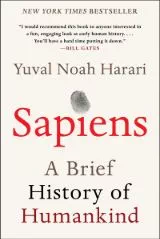So You’ve Been Publicly Sha...
The latest magnum opus from journalist and no...
By Reanna Quitzon1434

0

This book covers a brief overview of the history of human beings spawning 2.4 million years.
Sapiens is based on the lectures of the Israeli professor of history, Yuval Noah Harari (also the author of the book), who taught at The Hebrew University of Jerusalem.
The non-fiction book begins with a vignette of the Stone Age, leading to a detailed narration about current Homo sapiens. It ends with a prediction of what to expect from post-humans.
The book, published in English in 2014, is a very nicely constructed account of humankind’s evolutions and revolutions.
Harari portrays the Stone Age humans as highly unremarkable beings before the cognitive revolution changed things significantly, some 70,000 years ago. As a result, we, as a species, started showing signs of ingenuity and spread across the earth at a quick pace.
This era was followed by the period of the agricultural revolution that started 11,000 years ago. The author has a very strong opinion on agriculture becoming a way of life by overshadowing the hunter-gatherer lifestyle.
He even goes out on a limb to claim that the agricultural revolution is history’s biggest fraud as it brought a worse diet, an ugly form of hierarchy, overcrowded civilizations, and longer working hours.
The next important revolution of mankind came in the form of the scientific revolution that started 500 years ago.
This gave birth to the Industrial Revolution 250 years later. The information revolution started 5 decades ago and currently, we are witnessing the biotechnological revolution which, according to Harari, would lead to Homo sapiens evolving into bio-engineered ‘a mortal cyborgs’.
The book highlights a lot of landmark aspects of our history, including the development of language, the concept of money and credit, significant empires, the rise of capitalism, food habits, etc.
He says that we may have undergone millions of years of revolutions and evolutions to reach the point to date, but we still have the hunter-gatherer DNA that explains most of our general behaviors.
Sapiens starts off with a well-researched account of humankind. But as it progresses, it is hard not to notice the author’s quest for overemphasizing his strong opinions and his eagerness to sensationalize matters.
Despite these shortcomings, the book emerges as a very interesting and informative read about where we came from and where we are heading.
Updated 4 years ago